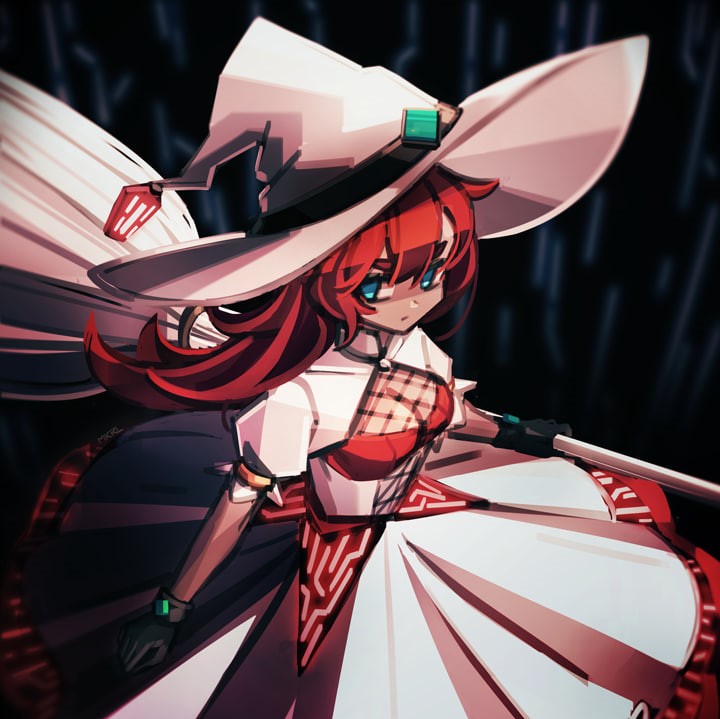I wish I remembered more specifically, but there was a book we read in high school that had super heave handed symbolism, like embarrassingly so, and this guy in my class insisted that it only meant what the text literally said.
The consequences of the proliferation of “the curtains were fucking blue” can be seen in the fairly common belief that the only good art is only photorealistic drawings
I see this too, right wingers hate art that isn't purely representative
Yeah I've seen some of his paintings, they're entirely unremarkable, like better than someone whose never/barely practiced but that's about it
I wonder if conservatives would take to abstract art if they learned that it was once used as a weapon against communism
Yeah there's plenty of room for criticism when it comes to people reading into a thing that aren't really there, but my god there are some types of people that you can slather on the symbolism so hard that anyone with an analytical mind instantly hates it for being too pushy and they still won't understand.
Like yes color language is a real thing that real authors often use in writing, sometimes even unconsciously because that's just how we group with the colors of symbols in our head. Red often means stop, danger, or passion. Even if a writer didn't think about it actively, you probably don't see bright yellows and pinks in a situation that is meant to be dangerous. They're likely to use some form of red just because that's what comes naturally to us.
I don’t remember that shit from the game. Fuck everything about that.
it doesn’t make any difference to the story or to real life
Dead men should be quiet in their graves, but they never are.
whenever someone goes "the curtains were fucking blue!!1!1!" I usually just assume they're some stupid teenager who just hates doing their English homework
or if confirmed not a literal child, then I think they're just too dense to understand art that isn't spoonfed to them on TV. reductionist indeed
Convincing people that words don't actually mean anything is how capitalists keep the workers from understanding dialectical materialism.
I'm well aware lol. Just started reading Grundrisse and the forward by Martin Nicolaus makes this exact point (using mainly citations from Lenin's Philosophical Notebooks). The Hegalian method relies heavily on language and terms that might seem superfluous on first glance but actually hold a lot of meaning. Like the concept of "suspension" which if read uncritically is meaningless, but in the context of the dialectic, is super powerful because of it's double meaning of both ceasing movement and also maintaining the process of movement.
All meaning comes from some form of contradiction and if you only ever see one side of the contradiction, you haven't really seen anything.
Lol, I was just using that as an example because that happens to be what I'm literally reading right now. The only reason this particular book is written that way is because it was essentially his notes, it was never published.
He basically took these and wrote Capital with them, even that's a bit rough, but it's also not full of terms that are used as placeholders for contradictions.
:citations-needed: https://citationsneeded.medium.com/episode-144-how-the-cold-war-shaped-first-person-journalism-and-literary-conventionss-42bf68ccaef
:jesse-wtf:
I agreed with your OP but now I feel like you're going off the rails. Show don't tell is fundamental writing advice and I don't understand how it's supposed to be anti-communist. Fictional works obviously contain many different messages which can be meaningful and worth analyzing regardless of whether or not they're intentional.
It sounds more like you had a teacher who either didn't understand the material or was bad at teaching it, than a problem with "show, don't tell" or encouraging people to draw their own (informed) conclusions, which are both good things.
I might be more willing to hear you out if you didn’t make it personal.
Did I?? I thought I just said that I didn't agree with or understand where you were coming from.
I suppose these guys also went off the rails.
https://mattiasinspace.substack.com/p/is-show-dont-tell-a-cia-psyop
But does this mean that, to fight off the malign influence of the military-industrial complex, we must reverse the advice and begin telling instead of showing?
When I think of fiction writers who are infamous for favouring telling over showing, I think of Ayn Rand. I can’t think of any other writer of enduring fame who is so committed to propagating a specific ideology in the pages of her novels. John Galt’s speech in Atlas Shrugged is ninety pages long, and for all intents and purposes might as well be the voice of Rand herself. Yet Rand’s non-communist credentials are hardly in doubt.
What’s missed in the opposition to “Show don’t tell” on this basis is the reason it is so successful. When applied moderately, without stripping necessary telling, it naturally produces more impactful writing. Novels that, in service of communicating a thesis, ignore the sensory and emotional world of their characters do so at the expense of those characters. They prematurely end the life those characters would have had in the reader’s mind.
I think that link agrees with me? They say that show don't tell is good advice, in moderation.
Editing in because, wow, even moreso
“Telling” can also mean “telling the reader what to think”. In my view, this truly is bad creative writing. If it is obvious to the reader that you want them to hate a certain idea, or a certain character, the reader will lose his sense of agency. Reading, too, is a creative process. Ultimately, a novel is a series of collaborations between the writer and each of her readers, the end result of which are interpretations that live on in those readers’ minds. To tell the reader how to interpret one’s novel as he reads it is, put simply, a violation of his boundaries.
It is useful writing advice for modern audiences (in part because that’s what modern audiences, like you,
Who's making it personal again?
have come to expect so it becomes self-reinforcing) but I wouldn’t call it fundamental, considering how the “show, don’t tell” mandate is relatively new when it comes to the very old canon of literature and literary analysis going back thousands of years.
Aristotle, Poetics
If you string together a set of speeches expressive of character, and well finished in point of diction and thought, you will not produce the essential tragic effect nearly so well as with a play which, however deficient in these respects, yet has a plot and artistically constructed incidents…. Character is that which reveals moral purpose, showing what kind of things a man chooses or avoids. Speeches, therefore, which do not make this manifest, or in which the speaker does not choose or avoid anything whatever, are not expressive of character.
Averroes, 12th century Spanish writer
Poetry should not employ the weapons of rhetoric or persuasion. It should simply imitate, and it should do so with such vivid liveliness that the object imitated appears to be present before us. If the poet discards this methods for straightforward reasoning, he sins against his art.
I'm sure I can find more examples, if you like. Isn't show, don't tell, like, the entire idea behind poetry?
My intention is just to discuss the concepts, I still don't see what I said that was personal.
When you said that show don't tell isn't fundamental, I took that to mean that you don't consider it good advice, except in a modern context, because of how it's been pushed. If you agree that it's generally good advice (in moderation) regardless of time and place, then we're on the same page. Of course the specific phrase is relatively new, but as I showed, the fundamental concept has been around since ancient times.
As an aside, like, the CIA also funded Jackson Pollock and I don't think his paint splatters are anti-communist. They also funded psychics and shit. They were just throwing shit at a wall to see what would stick, imo.
Starting off with a :jesse-wtf: and telling me I went off the rails isn’t exactly an invitation for anything but a defensive response.
I said that I agreed with your OP. I didn't understand what the fuck you were talking about so I used the wtf emoji. I apologize if it came across as a personal insult, as that was not my intent.
“Show don’t tell” isn’t new, but the school of thought that started making it more mandatory as an expectation is. Especially if that’s taught in a sloppy and slapdash way, it leads to a lot of author intent failing to get delivered. That doesn’t mean that a bad classroom is necessary for intent getting lost in the “showing” and “not telling.” For example, Upton Sinclair’s “The Jungle” never actually was intended to be a direct criticism of the meat processing industry but instead a wider-reaching message that culminated in a happy ending with Sinclair himself as governor of California. As the well known quote goes, he aimed for the heart and hit the stomach, and we got the FDA as a result. Still a good thing, at least.
I agree that it's possible for the message to get lost this way, but for the record I'll note that "The Jungle" predates the CIA and "show, don't tell." Language is an imperfect tool of communication, and the intended message can be lost just as easily through telling as through showing. If I write, "John was sad," then I'm basically just hoping that the reader has the same feeling come to mind that I'm thinking of, because sadness can vary greatly in how it feels and in intensity. Furthermore, as words change in meaning over time and across languages, the meaning can easily become lost or changed. If I instead describe how John expressed his sadness, then the reader is much less dependent on shared understanding of specific words. If I write, "John could not be roused from his bed for three days," then you can better understand what I'm trying to convey, and that meaning is more robust across language and culture.
Yes, the CIA funded some slapdash things, but I still disagree about both the intent and success of “show don’t tell” academic reformations. A lot of Marxist theory is very wordy to the point of it being a meme even here (“read theory!”), while by contrast capitalist ideologies and liberalism are very easy to absorb and have been internalized for generations in the United States with very little contest.
It may be that the tell-iness of classic Marxist theory factored in to the promotion of show don't tell. But this doesn't mean that show don't tell is an inherently anti-communist thing, as those works are only one way of expressing the underlying concepts.
Speaking personally, I was raised Catholic. In Catholicism, there is one, exact way to talk about certain things, such as the Trinity. This parody does a good job of satirizing it. The fact that the Trinity cannot really be expressed except by telling proves that it's a weak, hollow concept, really just a series of words to recite. The nature of truth is that it has substance - when something is true, there are many different ways to show that it's true, many different ways of expressing it. Showing is helpful because that sort of hollow dogma cannot be shown. As such, when a concept is shown, it is generally more compelling.
To teach a single dogmatic interpretation and to open things up to the point that all interpretations are equally valid are both extremes which don't require any real understanding of the nuance of the text. The proper balance is one of informed individual opinions. If an interpretation is based on factual inaccuracies, misinterpretations, or bad faith, then that interpretation is not valid.
However, this "proper balance" is not a balance between dogma and modern literary criticism. The balance is between dogma and lazy/apathetic teachers. "All interpretations are equally valid" is a strawman version of The Death of the Author, it is not a serious academic position.
The truth is, many people are stupid, including me, and telling them what exactly you’re trying to say is an excellent idea for this very reason
Ok then. You are wrong. Show don't tell is good and you should agree with it
Telling is literally so easy wtf
So I take it you agree with me now, since I told you what to believe? Or was I unclear?
I just think we're on different wavelengths tbh. I didn't understand how I was making it personal and now I don't understand how I'm invalidating your experiences. I'm just arguing that your experiences were the result of bad teacher(s) rather than ideology, I'm not saying that they didn't happen or anything. Honestly I don't really want to continue the conversation.
I also still see it all the time. Especially with gamers and the Disney crowd.
Man I’m terminally online and some how I’ve managed to miss this cliche. Literally never heard of it until now
i think it's just anti-intellectualism from high schoolers who (quite reasonably) don't see a use for literary analysis.
Tbf you could also argue that the entire concept of shit you are taught having a direct materially beneficial(usually monetary) use is a part of the education system under capitalism fundamentally being built to train a labor workforce.
Even if I dont have any direct practical use for any of the analytical tools I learned or the analysis I occasionally do on my own, I feel that I benefit in some abstract way by having them.
I think critically examining literature is a good thing for young people to be exposed to, and that reading generally is beneficial to the human spirit, but it's difficult, especially with the resources available to public school teachers, to make it feel like more than just wank and busywork.
It is just a wank. That is all literature analysis is. Its value is that people enjoy arguing about the fun parts of a story.
For some reason it has turned into something like numerology but with academic clout. People do free association between symbols in their favorite literature, and they think they are both doing critical thinking and learning something about the world. But it will never be a legitimate academic subject, because it has no way of knowing.
what is a legitimate academic subject? and bro i swear to god bro if you start advocating for scientism i will blow up this Forever 21 right now
Scientism, broadly. Anything with a way of knowing. That way the academic subject can advance human knowledge.
:honk-enraged:AAAAAAAAAAAAAAAAAAAAAAAAAAAAAAAAAAAAAAAAAAAAAAAAAAAAAAAAAAAAAAAAAAAAAAAAAAAA DIE EMPIRICUCK
:nuke:
Been re-watching LOTR and the fact that everyone "good" is white is obviously problematic.
Doesn't mean I don't cry every time when Theoden does his speech in ROTK and they ride down to the Pellanor screaming "DEATH"
Idk wtf you’re talking about but that comic is pretty cool and funny
Only vaguely related but "Death of the Author", even if it is the title of an old book, is such a ridicoulusly pretentious term for a really quite simple concept that it genuinely makes me cringe to say it.
Fight Club is a book by a gay guy about how fucking weird the straights are, yet here we are.










